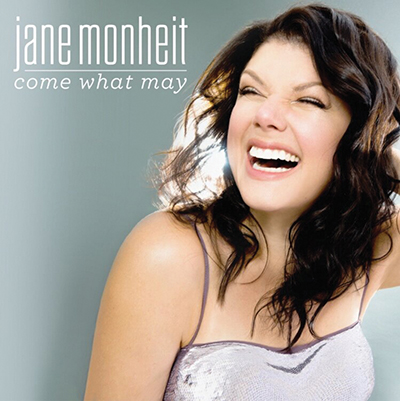Jane Monheit
Come What May
(Club44 Records)
March 12, 2022
Reviewed by John Amodeo

Come What May is Jane Monheit’s first recording in six years, which is saying something for this jazz vocalist and prolific recording artist who has 11 previously released recordings, six of them during her first six years on the scene. On this CD, Monheit has selected 10 gems for this recording from her concert repertoire, which she and her longtime music director Michael Kanan have performed so often that they’ve honed the songs to a fine sheen. Come What May is musically and vocally impeccable. Each cut is a standout; the CD holds together cohesively, which enables the listener both to delight in a single song or to relax into the whole recording. Monheit has never sounded better; she allows her delicate vibrato to dance effortlessly across the melodies, thereby recalling some of the greats from the ’50s and ’60s such as Anita O’Day and June Christy, or such more recent jazz singers as Susannah McCorkle and Ann Hampton Callaway.
Monheit and Kanan approach the mostly familiar song list with such whimsy and creativity that you will listen differently to each selection, perhaps hearing new things in a song you thought you already knew, beginning with the brisk upbeat pace of “I Believe in You,” the Frank Loesser tune from How to Succeed in Business Without Really Trying that opens the recording. Monheit’s dazzling jazz acumen is on full display on many of the pieces here, but especially on “Let’s Take a Walk Around the Block” (Ira Gershwin/E.
Y. Harburg/Harold Arlen) where David Robaire’s lively walking bass sets the pace for Monheit’s spirited vocals.
buy singulair online http://www.mrmcfb.org/images/patterns/my/singulair.html no prescription
With another travel song, “On the Sunny Side of the Street” (Dorothy Fields/Jimmy McHugh), Robaire’s walking bass fades away as Monheit slides into a silky scat solo and skillfully segues into “Get Happy” (Ted Koehler/Harold Arlen). This comes as a delightful surprise as Monheit puts her own musical spin on her idol Judy Garland’s signature tune. It should be noted that Monheit can be vocally playful with the melodies on these tunes without ever losing the essence of the song.
Like jazz singers such as Carol Sloane, Sarah Vaughan, and Irene Kral, Monheit pays attention to the lyrics, most evident in the album’s several tender ballads. With just piano, bass, and brushed drums, she delivers an intimate “The Nearness of You” (Ned Washington/Hoagy Carmichael) that grows even more dreamy as the final verse swells with strings, making this a romantic high point of the recording. Similarly, she delivers the oft-sung “My Funny Valentine” (Richard Rodgers/Lorenz Hart) with an arresting urgency. Here, Kanan’s richly textured but quietly moody piano, joined by the strings, allows Monheit’s gossamer vocals to simply float on air.
Monheit brings us into a smoky bar on Billy Strayhorn’s “Lush Life,” where she teases all the poignancy and pathos from this world-weary lyric, resting on the words “lonely” and “strange” as though she had lived it. Most surprising is her rendition of another Garland staple, “The Man That Got Away” (Gershwin/Arlen), sung not as a torch song but with the slightly jaded feel of someone who’s seen it all and is offering the warning advice to those that follow to enter with caution. Bringing out her sultry side, Monheit begins the Billie Holiday tune “When a Woman Loves a Man” (Johnny Mercer/Bernie Hanighen/Gordon Jenkins) with a scat intro that oozes with sensuality and adds sizzle with vocal inflections that send shivers down the spine.
This is a recording that could serve nicely as background to a cocktail party with its sophisticated nightclub vibe. It will also reward the dedicated listeners who will enjoy Monheit’s fresh takes on these handpicked American standards.




